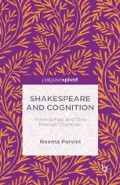Abstract
In this book, I hope to have shown some of the ways in which insights from modern experimental psychology can shed light on some of the fundamental critical questions at stake in Shakespeare’s plays. I also hope to have made evident how Shakespeare himself demonstrates an implicit understanding of human thinking that anticipates the findings of recent psychological studies. In addition, as a writer of extraordinary insight into the workings of the human mind, Shakespeare presents interesting and sometimes awkward challenges to the conclusions drawn by some of those studies.
Access this chapter
Tax calculation will be finalised at checkout
Purchases are for personal use only
Preview
Unable to display preview. Download preview PDF.
Author information
Authors and Affiliations
Copyright information
© 2015 Neema Parvini
About this chapter
Cite this chapter
Parvini, N. (2015). Concluding Note. In: Shakespeare and Cognition: Thinking Fast and Slow through Character. Palgrave Pivot, London. https://doi.org/10.1057/9781137543165_6
Download citation
DOI: https://doi.org/10.1057/9781137543165_6
Publisher Name: Palgrave Pivot, London
Print ISBN: 978-1-137-54315-8
Online ISBN: 978-1-137-54316-5
eBook Packages: Palgrave Literature CollectionLiterature, Cultural and Media Studies (R0)

